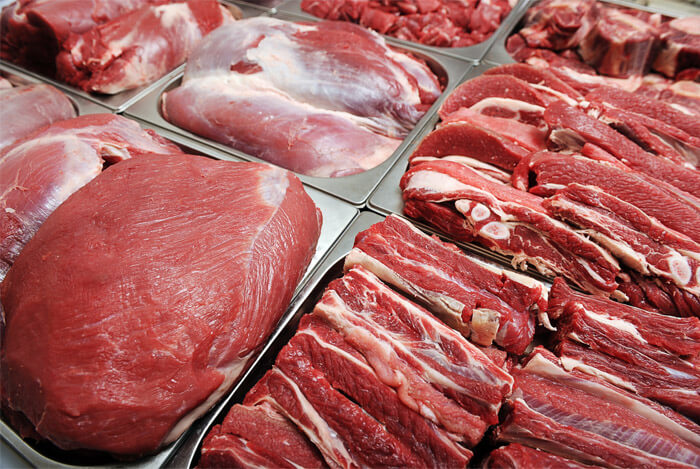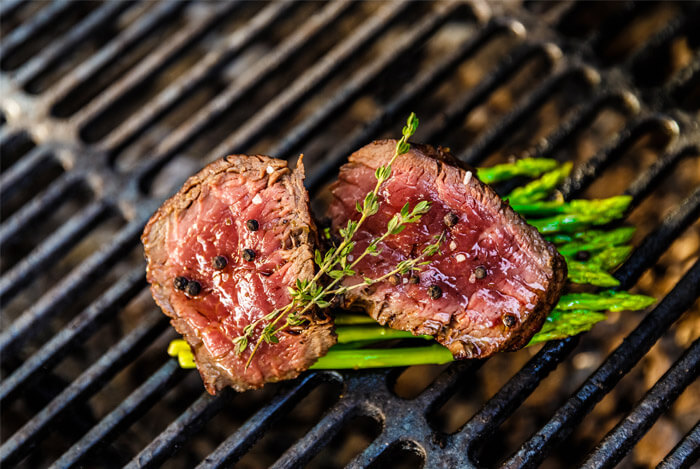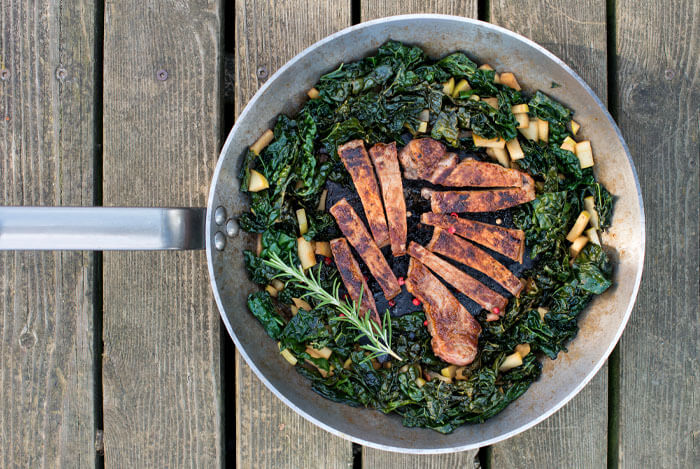Vegans and vegetarians may have their own reasons for avoiding meat, but it’s an enjoyable staple for many of us – in moderation. An excess of processed meat isn’t healthy, and it’s been linked to increased risk of heart disease and type 2 diabetes.
But who doesn’t love a juicy burger or a perfectly cooked steak every once in awhile?
Before we get into the review that may send us running for the vegetarian hills, let’s get some basics out of the way.
The report we’ll be talking about today makes a distinction between processed and unprocessed meat, and one of them is much worse for your health.
- Processed Vs. Unprocessed Meat
- A Controversial Study Reveals Confusing Results
- How You Cook Your Meat Matters
- Take This Report with a Grain of Salt
- So Should You Stop Eating Meat?
Table of Contents
+Processed Vs. Unprocessed Meat
There’s a big difference between unprocessed meat and processed meat, and they carry equally different health risks.
Processed Meat

Processed meats include products such as:
- Deli meats
- Hot dogs
- Bacon
- Sausage
- Pepperoni
- Corned beef
- Canned meat
- Jerky
By definition, chicken and turkey products – such as chicken sausages and turkey bacon – also fall into this category, even though they’re technically white meat and not red.
All of these meat products are considered “convenience meats” because it’s pretty much OK for consumers to enjoy these foods right out of the package with minimal cooking required.
Preserving these meats so they’re shelf-stable and consumer-ready used to mean long processes of smoking and salting. However, preservatives are generally used to keep them fresher longer.
It’s these curing processes that may be carcinogenic in large amounts over time.
Unprocessed Red Meat

When we talk about unprocessed red meat, we’re referring to meat that’s red when raw, such as:
- Beef
- Pork
- Veal
- Lamb
- Mutton
- Goat
- Horse (if that floats your boat)
So now that we know what we’re dealing with, what does the science say?
A Controversial Study Reveals Confusing Results

The IARC gathered 22 scientists from ten countries to pour over data from more than 800 studies on over 12 types of cancer.
They evaluated 984 possibly carcinogenic agents — from chemicals to careers — and pooled this evidence together in a mega review.
After analysis of the data, the researchers estimated that every 50 g, or roughly 2 ounce, portion of processed meat eaten daily increases the risk of colorectal cancer by about 18%.
That serving size is basically the equivalent of one small hot dog or about two slices of salami or deli ham.
There were positive links between red meat and pancreas, stomach, and prostate cancer as well, but they were not as strong as those found associated with processed meat.
Scientists now classify processed meat as a known carcinogen.
Unprocessed Red Meat

Unprocessed red meat has been classified as a Group 2A carcinogen. This means it’s probably carcinogenic, but there’s no definite evidence to prove so.
Researchers from one review that examined 35 studies, and another that reviewed 25 studies, discovered that unprocessed red meat had very weak cancer risks for men and almost negligible risks for women.
Two cancer-causing compounds formed in meat are created during cooking:
- Heterocyclic amines (HCAs), which are formed when meat sears at high temperatures.
- Polycyclic aromatic hydrocarbons (PAHs), which get into your meat when it’s charbroiled.
Since raw food doesn’t contain any HCAs or PAHs, most of our exposure comes from cooked meats, including fish.
While studies haven’t directly linked these carcinogens to cancer deaths, they’re definitely not something to mess around with.
How You Cook Your Meat Matters

If you’re a fan of charred or well-done grilled meats, don’t swear them off forever; there is a bright side.
Marinating your meat in antioxidant-rich spices, such as rosemary, thyme, ginger, oregano, turmeric, curry, spicy chili, and paprika, for at least one hour before cooking can cut HCAs by as much as 87%, according to a study completed at Kansas State University.
You could also try finding healthy recipes for that slow cooker you have buried in a cabinet somewhere. These time-savers don’t cook hotter than 300 degrees.
Remember: the lower the temperature for cooking your meat, the fewer HCAs and PAHs you’ll be exposed to.
Take This Report with a Grain of Salt

First off, this review isn’t groundbreaking news in the nutrition world.
Here’s a study from 1975 that says: “Dietary variables were strongly correlated with several types of cancer, particularly meat consumption with cancer of the colon.”
We keep studying this topic nearly 40 years later because it’s so hard to get solid scientific evidence.
The IARC says it used studies spanning 20 years in participants from around the world. But red meat isn’t something that everyone in the world has equal access to.
High intakes tend to correlate with developed countries, while poorer countries see very minimal meat consumption.
Developed countries usually follow typical “Westernized” lifestyles, i.e. the citizens also:
- Drink alcohol and smoke cigarettes
- Eat highly processed foods with simple carbs and high sugar content
- Skimp on fruits and veggies
- Pay zero attention to fiber
- Have sedentary activity levels
- Tend to have high BMIs
How can we analytically separate red meat consumption from all these other factors that might also increase the risks of developing cancer?
Simple answer: we can’t.
Controlled clinical trials would have to find participants who had relatively similar ages, lifestyles, and family medical history.
Then they would need to isolate these participants in their own world where their food, exercise, and lifestyles were controlled to eliminate other variables from interfering with the meat consumption results.
Because cancer can take years — sometimes decades — to develop, finding volunteers to literally donate their lives to research probably won’t ever happen.
So instead, researchers used studies of participants who already have cancer to see if they could find correlations between their diagnoses and their eating habits.
Notice that word correlation.
Correlation does not mean causation.
For example, the number of Nobel Laureates won by a country correlates surprisingly well with per capita chocolate consumption.
Here’s my biggest problem with this review: most of the studies used were based on self-reported participant data.
Meaning, the participants had to record their food intake for days, weeks, and probably years. Self reported intakes are notoriously inaccurate, which also makes the results less valid.
So Should You Stop Eating Meat?

On average Americans eat about a quarter pound of red meat per day.
While we know that processed meats have the strongest associations with cancer, the links between unprocessed red meat are much weaker and much less consistent.
Meat is generally a healthy addition to your diet when eaten this infrequently.
It’s also possible that some of the supposed negative effects of eating meat are more to do with not eating enough fresh fruits and vegetables.
Final Notes
Eat lots of fresh fruits and vegetables, limit your intake of processed foods, and exercise regularly, and your risk of cancer will probably be fairly low.
If you’re at risk for certain cancers, get screened regularly and increase your chances of detecting abnormalities early on, when they’re most successfully treated.










